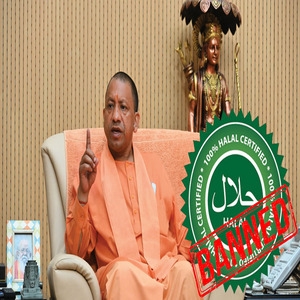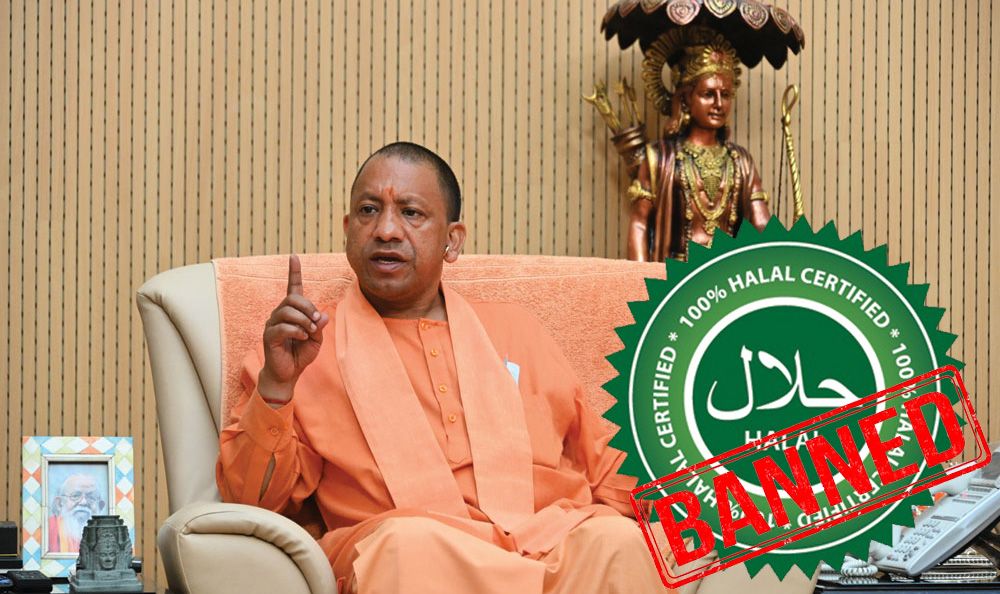
.png) Ram Puniyani
Ram Puniyani

A new divisive agenda has taken hold over India’s most populous state -- Uttar Pradesh – with the government banning halal-certified edible items. In the province that has contributed the most Prime Ministers and where the holy sites of Ayodhya and Kashi, revered by the Hindus, are located, the ruling regime seems to have hit upon a pre-election issue to hit the bullseye.
Voters, who might want to drift away, anguished by the lacklustre economic situation and poor employment record, seem never to lack a polarising issue to galvanise them in Uttar Pradesh. It began decades ago with the Ram Temple issue, but now politics is tuning into the Kashi Vishwanath temple ‘issue’.
Meat and meat consumption capture headlines regularly while few note how Uttar Pradesh has become a hub for wandering stray cattle, which are allowed to recklessly roam the streets, creating a nuisance, and falling prey to passing vehicles; they cause economic loss for farmers by raiding standing crops. Politics related to cow slaughter and allegations of eating beef have taken many lives in Uttar Pradesh; the lynching of Akhlaq, Junaid, and Rakbar Khan among others has sent shockwaves at regular intervals. Still, those ruling the state apparatus seem to have an appetite to repeatedly bring up the meat issue.
Uttar Pradesh has paid dearly for communal politics every time it has been raked up. So-called love jihad has raised such a heated political issue in the state that it culminated in the Muzaffarnagar violence of 2013. With Adityanath Yogi as the Chief Minister since 2017, the problems of the state have only grown. The frequency with which hate speeches are made, the raids on meat shops that have devastated the economy of a section of the Muslims and Dalits, and the introduction of bulldozer (in)justice -- all have frightening consequences for the disadvantaged groups, and especially for the religious minorities.
Interestingly, the ban on halal-certified edible products applies only to the local market. Products meant for export have been excluded as the meat exported to countries where halal meat is consumed requires halal certification. Halal, in Arabic, simply designates what is permissible as per Islamic religious practices. Halal certification of meat items guarantees that the animals, including poultry, were slaughtered in the prescribed Islamic way. India has no clear nation-wide law or rule that requires halal meat to be sold -- it has been left to individual preferences. Meat that is exported is, naturally, subject to proper checks for halal certification.
The halal trade is economically highly significant, and India has benefitted vastly from the promotion of halal exports. Its significant trading partners are the Organization of Islamic Countries and South East Asian nations.
The Uttar Pradesh government has justified the ban saying that some companies had issued “forged” halal certificates for financial gain -- meaning that they did not follow the prescribed rules, but claimed they did. Surprisingly, a communal angle has been inserted into the forgery allegation by claiming that these companies cause social animosity and violate public trust. If the issue is fake halal certificates, why impose a blanket ban on domestic sales? If it is about animosity, where is the evidence?
Indeed, a more detailed presentation of the facts of this case known so far is here but was there a need to ban halal certified foods altogether? Does not the state government, along with the Centre, need to thrash out the law it wishes to prescribe, or not, in a more dignified and realistic fashion?
According to Mufti Habeeb Yusuf Qasmi, president of the Halal Council of India, the controversy over halal certification reflects the propensity to view every development from a myopic Hindu-Muslim lens. “Halal is about hygiene and purity. It is not a Hindu-Muslim matter, but about food”, he said.
All in all, the ban implies that those who do wish to consume certified halal edibles—which is, of course, the Muslims—would be denied access to these items. The situation is made even more ironic when the state government sees an effort to create a market for halal-certified products as a “conspiracy”.
But in the past, the state government’s problem was also with small meat traders, many of whom are Muslims. Immediately after coming to power, the Yogi Adityanath government shut many meat shops, saying they did not have proper licenses.
In the end, the Allahabad High Court asked the Yogi Adityanath government under which provision of law were meat shops in the state capital, Lucknow, being forced to shut. It rapped the Lucknow Municipal Corporation for not having taken timely action to renew the licenses of meat shops.
Meat has become a major irritant in Uttar Pradesh—one that has repeatedly aided the Uttar Pradesh government in polarising the state’s people and politics. But the politics of the Chief Minister goes beyond food. In a very blunt fashion, he coined the ‘80-20’ term, which implied that he was not banking on getting votes from the Muslims, who are 20% of the population of Uttar Pradesh. He put forward this formulation in an advertisement in a national newspaper, the dog whistle intensifying the communal divide as expected.
He also uses the term “abba-jaan”, which means dear father in Urdu, in his speeches to humiliate the Muslim community; he actually accused the community of appropriating food grains meant for all communities. He deliberately attributed the violence in Muzaffarnagar to its Muslim residents, although numerous fact-finding reports have disclosed that the violence was orchestrated in the name of the “security of Hindu girls”.
Further, it is not in dispute that the violence led to the large-scale displacement of Muslims from Muzaffarnagar, and that the Jats in the area suffered, too, but their losses were far fewer. Yogi Adityanath recklessly targeted the Muslim residents of Kairana town when he spread myths about the forced displacement of Hindus. It turned out that 346 Hindus had migrated away from Kairana, mainly for economic reasons.
Another divisive practice introduced by the Yogi Adityanath government, which other chief ministers of BJP-ruled states have adopted, is of bulldozing residential and commercial properties, mainly of Muslims and the poor, on a variety of pretexts.
Indeed, a structure could be illegal, but are bulldozers the government's only administrative tool against them? From recent experience, it has become evident that bulldozers are selectively used against Muslims and those the ruling Bharatiya Janata Party (BJP) considers its rivals or opponents. The practice, whatever the pretexts, has devastated coexistence in Uttar Pradesh, especially its Muslim residents. That is why it has been said that “while Yogi Adityanath has called bulldozers a symbol of development and peace and a means to enforce the law, the opposition has criticised his government by calling bulldozer ‘justice’ a violation of the law”.
All in all, the ban on halal products for domestic consumption is yet another instance of the divisive policies initiated in BJP-ruled Uttar Pradesh.
Halal certification is internationally accepted, and respecting people's feelings is the core of a plural society. Halal products, it must be remembered, are not just meat or culinary items but an array of products and services that inform the lives of many Indian citizens. Whatever the pretext for banning halal certification, this step will worsen the communal divide already prevalent in society.
One also must understand that the BJP repeatedly needs to strengthen its divisive core, especially since the Lok Sabha election is due in a few months. The halal ban is yet another issue for the BJP to whip up in the service of sectarian politics. Food habits and personal preferences, guided by the cultural practices of any community, must be respected. What fits the bill in a plural, diverse society should not be outlawed.